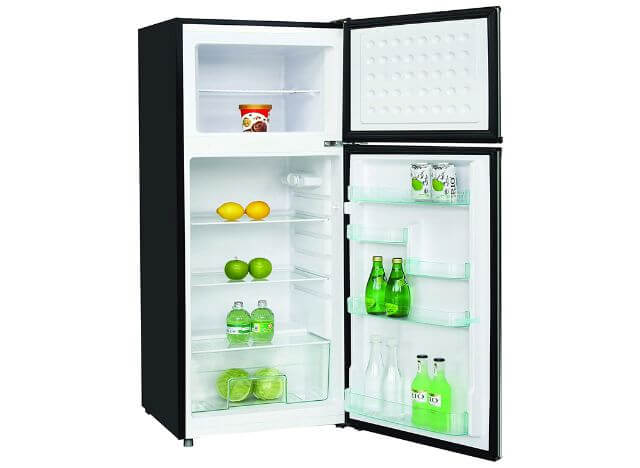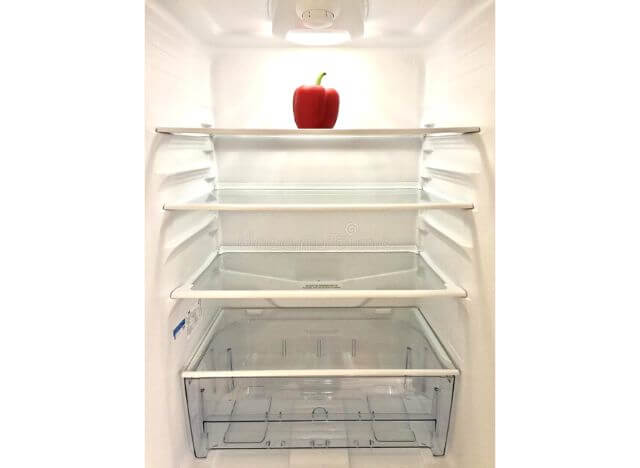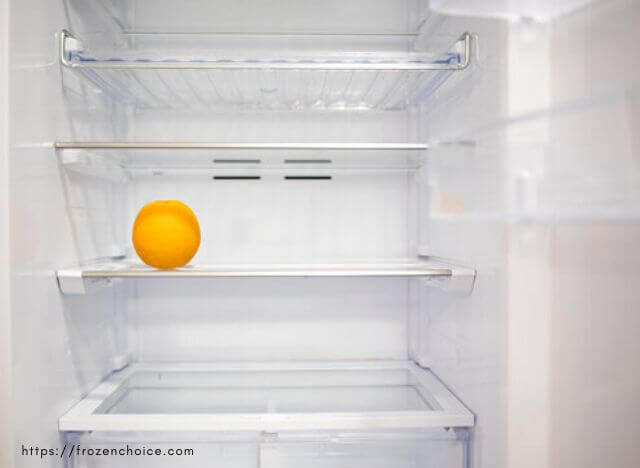A refrigerator is a necessary home appliance that aids in the preservation of food and drinks. However, there are many times when we do not have enough things to fill the fridge and question if it is safe to leave it empty. In this blog article, we’ll answer the question of “Is it ok to run a fridge empty?” and the consequences of doing so. Let’s get started!
Is it Ok to run a fridge empty?
Actually, yes, but it depends. These tools use approximately 799-1199 watts per day. As a result, running a refrigerator with no food inside wastes energy. However, you may perform this task sometimes.
You can operate a refrigerator when it’s empty, but it’s preferable to turn it off if you won’t be using it for two weeks or above to save energy and extend the life of your refrigerator. Switching it off warms the frigid compressor, so avoid turning it on and off multiple times per day or week to avoid damaging the compressor.

Fridge compressors should not suddenly expand or contract, according to MIT. As a result, it’s best to avoid turning them on and off regularly. If you must do so, make sure the freezer is full of food so the compressor isn’t required to work as hard.
When you’re on holiday or away for a prolonged amount of time, unplug your appliance. It’ll help save electricity and money and avoid possible dangers while you’re away.
The compressor happens to be the most expensive component of a refrigerator to replace, according to the United States Department of Energy. When the freezer is full, it runs more effectively because the compressor does not have to work as hard to keep the temperature cold. So, if you leave your freezer empty and running, you may be reducing its lifespan.
Further reading: Best Top-Freezer Refrigerator without Ice Maker
Should a refrigerator be full?
Most food experts recommend keeping the refrigerator 3/4 full.
A full fridge is more energy efficient than an empty one, but you need to give it some free space for efficient air circulation. Overfilling your refrigerator can impede the circulation of cold air. In the end, it will cause your food to spoil faster.
So strike a balance: enough food to make things work, but not so much that your fridge becomes a mess.
Frestec Mini Fridge with Freezer: Energy Saving, Low Noise
Why does an empty fridge or freezer consume more energy?
Water possesses a high latent fusion heat, which means it requires a lot of energy to transform from a fluid to a solid or conversely. Your refrigerator and freezer work hard to keep a water vapor buffer between the internal and external air.
That barrier becomes less effective if there’s less water vapor on the inside of the fridge, particularly when it is empty. As a result, your refrigerator must work harder to keep its internal temperature.

The same logic applies to freezers. A full freezer is much more effective because the foodstuff inside serves as insulation, allowing cold air to enter and warm air to exit. Because an empty freezer has the less insulating capacity, it must work harder to maintain its temperature.
But there are additional variables at work as well. An empty refrigerator, for example, is much more likely to produce ice buildup on the evaporator coils. The above ice insulates the coils and makes it more difficult for the refrigerator to discharge cold air. As a consequence, the fridge must work even harder to keep its internal temperature stable, consuming even more energy.
The same can be said for refrigerators. Ice buildup on the coils causes problems for the freezer to discharge cold air, requiring it to work harder and consume more energy.
Should you unplug a refrigerator when there’s nothing inside?
When it’s not being used, it hardly ever makes sense to disconnect your refrigerator. Refrigerators are not energy-intensive appliances, usually costing less than $100 annually to run, so there aren’t any significant savings involved with unplugging. They are intended to run continuously, and their lifecycle is best preserved during this period.

However, there are a few situations in which unplugging your fridge may be justified. Below, we’ll go over what they are, how to do it, and what the possible side effects are:
Holidays for a long time
If you intend to be gone for four weeks or over, it might be worth unplugging (along with all other appliances) to minimize the risk of an electrical problem while you’re gone.
Refrigerator malfunction
If your refrigerator is not staying cold, the compressor may be malfunctioning. If the motor continues to fail to start, there is a risk of an electrical fire, so unplug the device for safety until it is repaired or replaced.
Cleaning
If you have to deep clean your fridge, unplug it for a brief time. Be sure to wash each area carefully, dry completely, and leave the doors wide open for a brief period to allow the appliance to air out. Once you’ve finished cleansing, simply re-plug.
You may also like: 10 Best Mini Fridges with Freezer
Does unplugging a refrigerator damage it?
Unplugging household appliances is a common practice when they are not in use. And doing so can even save electricity. However, this is not the case with refrigerators. A refrigerator is built to keep food cool and fresh.
You should always plug in the refrigerator. But in case you need to unplug, take precautions. If you follow all the appropriate steps, unplugging the refrigerator will not damage it.
Empty the fridge. Remove all food and drinks before you unplug the refrigerator. Food, especially perishable food, will quickly spoil in a refrigerator that is not plugged in.
Then, turn off the temperature controller and ice maker. If you don’t know exactly how to do it, check your refrigerator’s manual.
Next, clean the entire refrigerator to avoid bad odors when the refrigerator is unplugged.
Finally, keep the refrigerator dry and plug it in. However, you should keep in mind this important note when plugging in. When the compressor of the refrigerator works, it creates a huge pressure. The compressor will not start if you unplug and reconnect the refrigerator immediately. Pressure buildup often causes this. Since it is the core of the refrigeration cycle, the compressor is very important.
As a result, plugging and unplugging the refrigerator immediately can damage the compressor. The compressor will have to start at this high pressure, creating an overload because the motor is not equipped for this situation. Built-in thermal overloads tend to damage both the compressor and the motor.
Therefore, you should wait at least 5 to 15 minutes before turning on the refrigerator again.
How to fix if the fridge was unplugged and then it’s not working
Stay calm even if your refrigerator has been unplugged for a while and now it’s not working. Please check the following:
Check that the power cord is plugged into a working outlet.
If the outlet is working, check the circuit breaker or fuse box. Simply reset it and plug the refrigerator back in if the circuit breaker or fuse is tripped.
The compressor may be faulty if your refrigerator is still not working. In this case, it is best to consult a professional refrigerator repairman.
A refrigerator is a long-term investment, and you want to make sure it has a long life. So if you care for and maintain it properly, your fridge will continue to keep food cold for years to come.
Refrigerator efficiency tips
Clean the coils
You should clean the condenser coils at least once every 6 months. It takes about 15 minutes to do this. They coils are placed under or behind the refrigerator. These snake-like coils are clogged with dirt and debris and need to be cleaned in order for the refrigerator to run properly.
Check the seals around your fridge doors
Also, make sure you have a proper door seal. When the door seal is worn or damaged, it will no longer keep the cold inside the refrigerator. This causes cold air to escape and requires the refrigerator to work harder.
Set the temperature to the optimum level
The refrigerator should be set at 37 degrees and the freezer should be set at 0 degrees. Anything colder will make your refrigerator work harder, using more energy.
It’s best to get a thermometer to measure the actual temperature of your refrigerator.
Make room around and inside your fridge
You should leave at least two inches of space between your refrigerator and the walls around it. The fridges need internal airflow to keep food cool, so make sure you don’t stack things too tightly on the shelves.
Without proper air circulation inside and outside your device, it will use more energy to stay cool.
Adjust the temperature of your kitchen
You should place the refrigerator in the kitchen where the temperature is not over 70 degrees. This is considered ideal temperature. If exceeded, the fridge will use 2.5% more energy for each degree exceeded.
Buy an energy-saving appliance
If your fridge or freezer are old, it consumes a lot of electricity, so you should seriously think about buying a new appliance which is energy efficient.
FAQs
Is it better to have a fridge full or empty?

The food you do keep in your fridge, particularly delicate items like lettuce, may spoil. It is truly preferable to keep your fridge at least three-quarters full of food. That way, there’s enough room for air to circulate easily inside while also providing enough food to allow each product to cool its neighbor down.
How often should you empty your fridge?
It’s best to give your fridge a deep clean every 3 to 4 months.
Empty the refrigerator of all its items and get rid of anything old or useless. Remove the crisper and meat cabinets. Clean up the fridge’s shelves and internal walls with a damp cloth dipped in soapy warm water. Warm water and dish soap should be used to clean the drawers in the washbasin.
How long can you leave a fridge empty?
If you’ll be gone for a month or less, we suggest the following: Allow the refrigerator to run. Keep the temperature controls at their default values. If all of the food has been removed and you wish to save electricity, set the temperature control to a higher setting during your absence.
How do you keep a refrigerator when not in use?
Store your refrigerator upright to protect the internal components and sealed systems. Keep the entryway open or ajar to keep odors and moisture away. Nothing should be placed between the door and the fridge to prevent it from opening if it pushes against the seal – this can harm the seal.
Conclusion
So, is it Ok to run a fridge empty? Running an empty fridge is not advised because it can cause a variety of issues. It can drive the compressor to work overload, which can result in breakdowns, as well as increased condensation, which can lead to mold and mildew development.
Furthermore, an empty fridge can cause a foul odor because the air inside the refrigerator becomes stagnant. Then, it is recommended that you keep the freezer at least 50 percent full to guarantee that it works efficiently and keeps your product fresh for a longer time.
Reference
Refrigerator storage recommendation, products.geappliances.com, retrieved on Apr. 12, 2023
Is It Bad To Run a Refrigerator When It’s Empty, kitchensnitches.com, retrieved on Apr. 11, 2023


